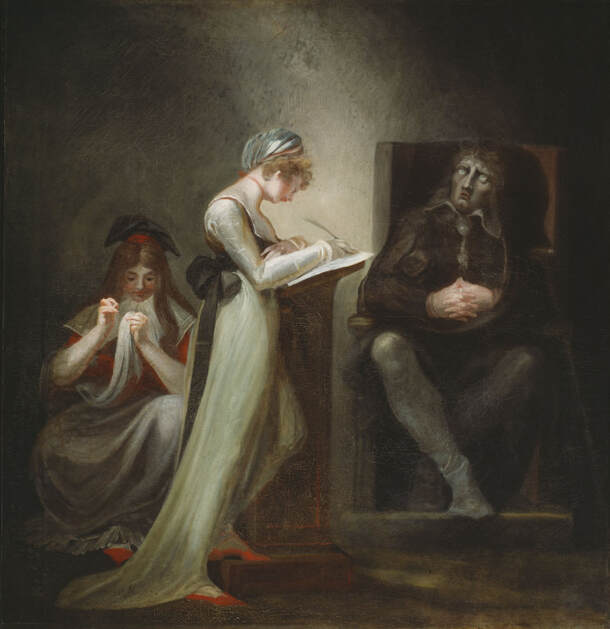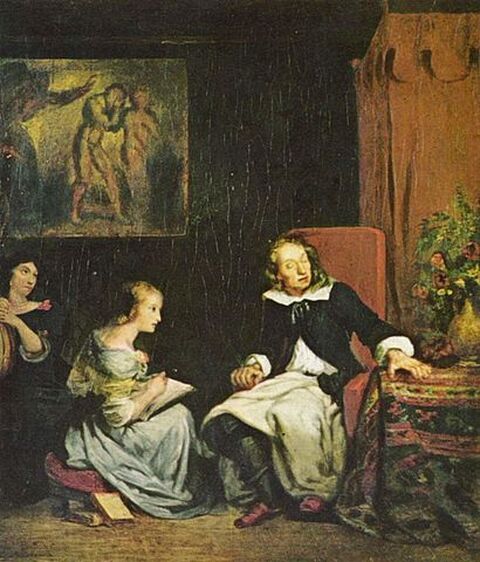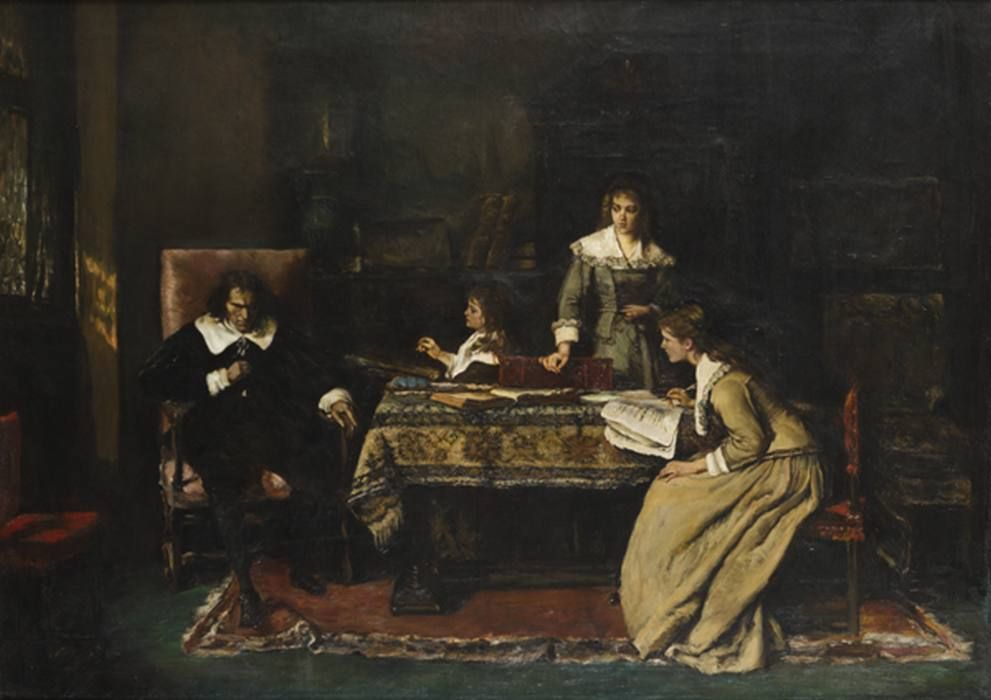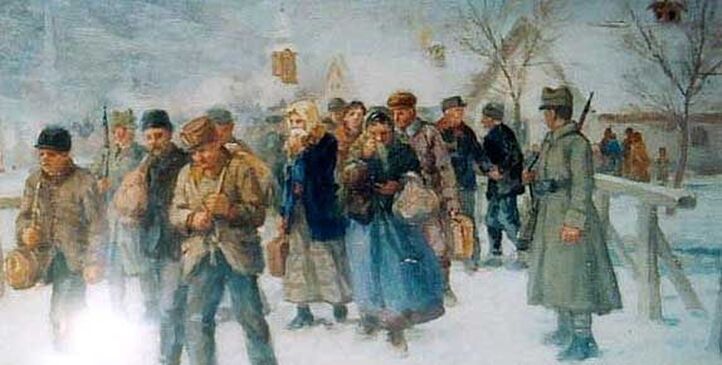The service was not a celebration of life, but a celebration of resurrection and life eternal; a solemn and pertinent reminder of the gift Jesus offers to every single one of us - but only if we choose to accept it. In this respect, I found the funeral service the priest gave to be profoundly relevant. It provided the proper perspective of death and mortality, a perspective that would benefit most contemporary people if they ever bothered to show any serious interest in their own mortality and the gift Christ offers.
|
My uncle's funeral was today. The priest presiding over the burial focused almost exclusively on Jesus and the promise of resurrection. There were no long, sentimental digressions about the life my uncle lived, or the lives he touched, or his achievements during his time in this world, or how much he would by missed, or how the world would feel emptier without his presence in it.
The service was not a celebration of life, but a celebration of resurrection and life eternal; a solemn and pertinent reminder of the gift Jesus offers to every single one of us - but only if we choose to accept it. In this respect, I found the funeral service the priest gave to be profoundly relevant. It provided the proper perspective of death and mortality, a perspective that would benefit most contemporary people if they ever bothered to show any serious interest in their own mortality and the gift Christ offers.
6 Comments
When Neo took the red pill instead of the blue pill, he chose reality over illusion, harsh truth over comfortable lies, cruel knowledge over blissful ignorance, and dangerous freedom over tranquil security. It was a tough choice, but most who have seen The Matrix would agree Neo ultimately made the right choice when he decided to wake up to reality - that choosing the red pill over the blue pill was the only moral choice.
I surmise this understanding is part of the reason why the scene has become such a popular and lasting meme in our culture and why the concept of taking the red pill has spawned an entire line of other existential and philosophical pharmaceuticals including the black pill and the God pill among others. Irrespective of the pill's color or content, people seem to enjoy getting 'pilled'; however, once they have swallowed a pill, they become addicted to taking pills and immediately begin looking around for the next one. And then the next one. It is worth remembering that Neo took only one red pill. Many contemporary people appear to be hooked on swallowing all the pills they can. This succeeds in doing little more than promoting a prolonged lifestyle of perpetual pill popping. Some people are not merely pill takers, but are bonafide pill pushers who exude tremendous effort flooding the world with a seemingly endless supply of truth-inducing drugs. One could argue this is unavoidable. Neo's red pill was terrifyingly blunt and comprehensive. Once Neo had taken it, there was no turning back, and there certainly was no need to take any more. Our world lacks such potent pills; hence, one could argue pillers must swallow bitter truths piecemeal - one pill at a time. In this sense, each pill serves as puzzle piece, and every truth pill must be consumed for the overall picture of truth to become comprehensible. As rational and appropriate as this sounds, I can't help but feel this represents a wrong turn. Rather than focusing on the harsh truth a given pill has exposed and working out a comprehensive understanding of how this harsh truth may be connected to other harsh truths through the process of thinking, pill poppers turn their attention instead on securing the next hit. The next high. And that's what chronic pill popping seems to produce. A rush of pill-truth is quickly followed by a desert of despondency, which can only be tolerated by another rush of pill-truth. Accessing truth quickly sinks to the level of recreational drugs. In my estimation, chronic pill-popping breeds passivity. Impotent revolt. Bitterness and resentment. None of these help a person deal with revealed harsh truths. And that is the big question hanging over our 'pilled' culture. What does one do once one has seen the truth behind the lies? The answer is accessible for those who have seen the Truth. Despite beliefs to the contrary, this answer does not come in pill form. The answer is simple, but requires work. A radical realignment of thinking and Being. Those blind to the Truth but addicted to truths will continue to pop pills in the hopes that one of the pills will eventually reveal all, but no pill ever will. Which is why it is best to get off the meds and begin approaching Reality with something approximating exalted sobriety instead. Before he retired eight years ago, my father worked as a chef. He was employed mostly by large hotels and usually worked the afternoon/evening shift, which ran from three in the afternoon to eleven at night. In addition to his full-time job, my father built and sold houses in his spare time. He had a well-defined daily routine, one he adhered to for the bulk of my childhood. He would wake up at seven, cook my sister and I breakfast, send us off to school, and then put on his tool belt and work on a construction project until about one o'clock, at which time he put his tools down and got ready to go to work at the hotel. On his days off, he worked on his houses in the day, and spent the evenings with the family. Simply put, my father was a hardworking man. He was driven by a deep desire to see his family prosper. And nothing was more important to him than his family.
I began helping my father on his houses after I turned thirteen and continued to help him well into my twenties when he finally got out of the business altogether. At first he gave me simple tasks to complete, like painting, but as I grew older he entrusted me with more complex tasks. I learned a great deal from my father during those years, not just about construction and the virtue of hard work, but about the importance of family and life in general. I have many wonderful memories of the two of us working side-by-side on everything from pouring concrete foundations to putting up drywall on interior walls. During these times we would discuss everything from my school work to the old Western films we sometimes watched together on the weekends. He enjoyed and appreciated my company while we worked together, and I felt fortunate to have the chance to work with him for the sake of the family. I have always had a deep respect for my father's work ethic and his dedication to his family. You see, he did not have to work so hard. The salaries he and my mother earned were enough to keep us all clothed and fed, but my dad chose to put in the extra work because he wanted to give his family every chance to succeed in life. And for that I am immensely grateful. My father is now seventy-three, but his love of work and commitment to family has not diminished a bit. He is currently visiting us from Canada. As he has done for each of the past three summers, he is helping me with my own ongoing home renovations. I often insist he take it easy and relax while he is visiting us (he is seventy-three, after all), but he will have none of it. He insists on helping me the way I had helped him in my youth. And I am happy he wants to help. The truth is, there is nothing else either of us would rather do than spend time working together for the benefit of the family. It is the tie that binds us. I am blessed to have had and continue to have such a wonderful relationship with my father, and I cannot even begin to fathom the immense positive influence his love of family has had on my life. I hope I can instill this love of family into my own son, and I hope my little guy will grow up feeling the same sort of father and son bond that I have experienced with my own father. If he does, I know I will have accomplished something truly special and meaningful. Before I launch into this rather hushed rant, I would like to preface this post by stating that writers, as individuals, are free to make whatever choices and decisions they deem fit when it comes to the writing, promoting, or marketing of their own work. This is merely my opinion of a topic. What individual writers do with their work on their own time is their own business.
Having said that, I am amused by the sheer number of writers, of both the self-published and conventionally published variety, who five-star rate their own works on sites such as Goodreads and Library Thing. In all honesty, this practice makes no sense to me. What is a writer attempting to communicate to potential readers when they garland their own creation with a five-star rating? In most cases, I feel it is probably nothing more than joyful affirmation of accomplishment or an innocent declaration of pride at having written and published - Hey, I have written this book, and I think it is just super! Nothing inherently wrong with that, I suppose. Writing and publishing a book of any length is an accomplishment of which one should be proud, and one could argue writers have the right to declare their own high opinions of the books they have written. There is also nothing inherently wrong with promoting one's book as something possessing merit, something that readers might find worthwhile and good. I imagine all writers, myself included, have engaged in this sort of thing in some form or other. Nevertheless, in my more cynical moments I surmise that five-star self-ratings are little more than attempts to skew the overall rating of a book to the positive side. After all, a five-star rating can do wonders to the overall average of a book if it only has ten or fifteen ratings in total. Then again, perhaps self-rating writers are simply self-aggrandizing egoists. Who knows? Though I do my best to be understanding and forgiving of five star self-ratings, I must admit they make me cringe, and I often wonder if others feel the same way. When I see a writer has given their own book the highest possible rating online, I can't help but see hubris. Five-star self ratings strike me as smug, arrogant, gauche, and pathetic all at once - akin to listing yourself as a reference on a resume. I do not rate my own books, and I don't think any writer should. Yes, I think the novel I have written has some merit and is of acceptable quality, but I am unwilling to declare this in the form of five little yellow stars. Firstly, no matter how good I think my novel may be, I know it is merely a transcription of an idea rather than the pure idea itself. The original vision for the book was five stars; hence, my transcription could never be that high. Readers may see it as five stars because, unlike me, they did not experience the vision and idea in its pure form. For them the book is the idea and the vision, so the chance exists that they might perceive it as something worthy of the highest praise. I, on the other hand, cannot. Secondly, though I am proud of my achievement, a part of me always feels it could have been better, that I did not reach the objective I had set for myself. Finally, I do not believe it is my place to rate the thing I have created. That is an activity best left to readers and critics. To put it another way, a chef's high opinion of his or her own dish is of little use if the food set before me is not to my taste. In fact, the chef’s high opinion puts me in awkward spot if I happen to find the food disagreeable. I will question either the chef’s taste or my own. In the end, my taste will win regardless. Concerning my novel, I have received some positive ratings, but I have received a fair share of one and two-star ratings as well. And that's fine. If I were forced to rate my own work, I would do it in the following manner: my book is all the stars in the known universe and no stars at all simultaneously. In other words, my novel is good, and it is nothing. There is simply no other way I can look my own work, and that's why I have avoided self-rating on sites like Goodreads. It is also why I have such a difficult time wrapping my head around writers who five-star their own books. Note added: This is a slightly edited version of a previous post published on January 28, 2018. I have spent the bulk of my summers completing home renovation projects since I purchased this old house in a small village in Hungary three years ago, and I am happy to report that my first planned project for this summer - repouring and re-tiling the terrace - is nearly done. Though I have some experience laying ceramic tiles, I am by no means an expert in the field, and I was a little apprehensive before I began this project because I had never worked with exterior tiles before. The tiles I put down were rather thick and dense, which made for difficult cutting, especially along the edges, but I somehow managed to put all the puzzle pieces together in the end. My wife took this photo of me (without my knowledge) while I was still engaged in the easier task of putting down whole tiles. I still need to complete the stairs and grout the whole thing, but for all intents and purposes, the project is nearly done. As I mentioned above, I am no expert when it comes to tiling floors, but I am satisfied with the end result I managed to achieve. Next week I plan to install the faux brick tiles on the terrace walls. Now that's where the real fun will be had!
Though I have not bothered to examine the details, I am aware of the general story behind the Jeffrey Epstein sex scandal. Of course, it's hard not to be aware of sex scandals involving celebrities, politicians, and the elite. After all, barely a week goes by without some high profile player being exposed for some sort of debauchery or other.
I have noticed that the general public tends to love these sorts of stories. It gives them a chance to wag their fingers and scoff in disgust without having to reflect upon their own immodesties and indecencies. Better still, even if they do take a moment to examine their own sexual immoralities, they can easily view them as harmless and trivial when compared to the grand depravities committed by individuals like this Epstein character. Take pornography for example. Avid porn consumers are likely to condemn Epstein's perversions as immoral, but are likely unwilling to accept that there is anything inherently wrong with their own chosen form of sexual hedonism. They could easily make a case built upon the basis of apples and oranges - that Epstein's crimes and viewing pornography are not even in the same league as far as sin or immorality go. And I suppose they would have a valid point. After all, what Epstein did is illegal and criminal, while viewing most forms of pornography is certainly not. For many years I had a fairly laissez-faire attitude about pornography. I considered porn to be a private matter - something an adult had the right to indulge in if they chose to do so. In fact, I regarded pornography in the same way I regard alcohol. Something to be consumed in moderation. Something that might even be beneficial if consumed in moderation. In the grand scheme of things, I did not consider pornography to be a big deal. It was, at best, a peccadillo. A minor, trifling fault. And in the grand scheme of things pornography probably is a peccadillo, but here's the catch - the lust that drives men like Epstein to commit their corruptions and the lust that drives people to sit down before a computer screen and view online porn essentially stem from the same source. Thus, in the ultra-grand scheme of things, the difference between perverts like Epstein and online porn perverts is only a matter of degree. And the problem with lust is its fiery nature. The spark in fantasy has a way of escaping and igniting reality. Seen this way, characters like Epstein are nothing more than pornography consumers acting out their fantasies in reality. And isn't that the secret wish of every person who watches porn? The wish that what watch online would somehow play out in reality? That they could find themselves in such circumstances in the real world? Those who claim porn is merely entertainment are deluding themselves. Porn is essentially wish fulfillment. All that separates Epstein from the average mild-mannered porn watcher is the amount of effort exerted to see the lust-fueled wish fulfilled in the real world. Seen this way, porn consumers are actually little more than Epstein-Lites. Same perverted motivations. One-tenth of the manifestation in physical reality. And of course there are spiritual aspects to consider, but I won't wade into all of that now. Fellow blogger William Wildblood from Meeting the Masters has been reading Paradise Lost for the first time and has written a couple of engaging reflections upon the experience here and here. I read Paradise Lost about twenty-five years ago. Though I remember the overall narrative of the poem, the major themes, and, of course, most of the characters (or rather how Milton depicted them), the passage of time has washed away the subtler aspects of the work from my memory. I suppose this accounts for my interest in William's posts on John Milton's magnum opus; they have served to remind me that Paradise Lost truly is epic work, in every sense of the word. Though it is common knowledge, not everyone who reads Paradise Lost for the first time is aware that John Milton was blind when he "wrote" it, and that writing for Milton essentially boiled down to dictating the poem to various amanuenses, a group that apparently included his own daughters. Whether or not Milton actually dictated the poem to his daughters is debatable, but the notion captured the attention of the public and many painters made the scene a subject for painting all the same. The first artist to depict the scene (as far as I can tell) was the Swiss born English painter Henry Fuseli. I respect Fuseli's overall romantic vision and there is much to be said for the masterful way he uses light and shadow to convey mood, but I find his depiction of Milton to be a little bizarre. The blank eyes were surely Fuseli's way of conveying Milton's blindness to the viewer, but it was a poor choice in my estimation. Milton's eyes glow in the painting, giving him the ghostly air of a possessed man. Sure, one could argue the haunting depiction is a masterstroke because it captures the otherworldly quality of Milton's genius, but for me Fuseli pushes this aspect too hard, to the point that he succeeds in making Milton look like Jacob Marley from Dickens' A Christmas Carol (yes, I know Jacob Marley came much later, but you get the idea). Milton's ghostly presence appears even more ghostly when contrasted to the other two figures in the painting. Nevertheless, I still like the painting very much Best known for his painting Liberty Leading the People, Delacroix was a master of creating scenes saturated with romantic energy, but his depiction of Milton speaking out Paradise Lost while one of his daughters records his works seems to contain everything but romantic energy. Don't get me wrong, I admire the painting and recognize the beauty Delacroix presents here, but the scene is rather flat (even with the image of Adam and Eve being expelled from Paradise in the background). The daughter doing the writing wears an intense expression as she listens to her father, but Milton himself appears somewhat listless. For all I know, he could be dictating his shopping list rather than his magnum opus. Having said that, the portrayal is probably realistic - this is probably what Milton actually looked like when he dictated the poem, but romantic painting is not about depicting everything realistically, so in this sense I humbly feel Delacroix comes up short. In my opinion, Mihály Munkácsy's Blind Milton Dictating Paradise Lost to His Daughters is the best depiction of the scene, and no, I don't think so simply because Munkácsy was Hungarian! To begin with, Munkácsy chooses to depict Milton's blindness in a subtle way - the eyes are not glowing, nor are they simply closed, but rather obscured by shadow as he broodingly "focuses" on the space before him as he dictates. Milton's posture is one of intense concentration, the tension apparent in the clenched right hand he holds before his chest.
When I look at Munkácsy's Milton I get the sense the figure in the painting really is dictating something epic. This is mirrored by the postures and expressions of the three daughters all three of whom appear to be completely engrossed by what their father is speaking to them. Look at the way the one recording the words leans forward in her chair, indicating complete dedication and interest. She is quite literally hanging on every word Milton utters. Now in all fairness, Munkacsy had the benefit of seeing the other two works before he composed his own rendition of the scene, and I imagine he studied both to some extent before he began his own composition. What do you think? Is Munkácsy's scene the best, or are you more partial to either Fuseli's version or Delacroix's depiction? Well, examining these three paintings inspired by William Wildblood's posts only serves to remind me I must reread Paradise Lost soon. Unfortunately, my to-read stack of books already touches the ceiling, so I am not sure when I will get to Milton's massive epic again. Well, my son is certainly having a good summer so far. That's him doing a ninja jump at the local pool.
Watching him play around in the water takes me back to my own childhood in Canada where I was fortunate enough to grow up right next to a small lake. This meant the neighborhood kids and I were in the water non-stop from mid-June until the end of August. Those certainly were the days. Of course, I didn't have cool lime green swimming goggles like my kid does, but hey. I snapped this photo outside my home on June 22, but forgot about taking it until now. It was just before five in the morning and the intense colors in the clouds lasted less than ten minutes before they faded to white.
When people discover I usually wake up at around four in the morning, they tend to look at me with a blend of pity and confusion, but being an early riser has its advantages. Beautiful sights like this being foremost among them. The average person in the West, the Anglo West especially, has no idea what a Danube Swabian is, or more correctly, what a Danube Swabian was. Right away a dilemma emerges. Can Danube Swabians still be referred to in the present tense, or do they exist only in the thickening shadows of the past?
That most people in the West do not know who Danube Swabians are or were is not surprising. Much of the general ignorance about Danube Swabians stems from the paradox of past and present I touched upon above. On the one hand, descendants of Danube Swabians - like me - still exist. On the other hand, the culture from which we originated is essentially dead in Europe, destroyed by waves of ethnic cleansing and the consequent communist frost that settled over Eastern and Central Europe at the end of the Second World War. I bear no grudge against the Anglo West for not knowing much about us Danube Swabians. After all, nearly seventy years have passed since the unique, hybrid German culture that had existed primarily in pockets of Hungary and the former Yugoslavia was extinguished. Seventy years is a long time. Even descendents of Danube Swabians, yours truly among them, struggle to understand who they are, or rather, who they were and where they came from. "Perched on Nothing's Branch" is the translated title of a book of poems by Hungarian poet Attila József. Though József wrote no poems about Danube Swabians, the title is a perfect way to describe the reality in which Danube Swabians like me exist. We are essentially suspended in the air, perched on a branch of a tree that has long been cut down. And it is only a matter of time before gravity pulls us down as well. When it does, it will pull down memory as well, after which we will exist as little more than curious, obscure footnotes in the books of forgotten history. I call myself Hungarian, and I am culturally Hungarian, but from an ethnic perspective, there is nothing Hungarian about me. Not a single drop of Magyar blood courses through my veins. Yet I speak almost no German, and I struggle to remember even the most basic customs and beliefs of my "real" people. My ancestors on both sides were ethnic German migrants who settled in Hungary in the late seventeenth century to fill the gaping wounds the Ottoman Empire had left in its wake after it withdrew its forces from Hungary after nearly two centuries of occupation. These ancestors of mine integrated themselves into Hungarian society to a certain extent, but maintained their language and unique traditions right up until the middle of the twentieth century, when the cold gears of diplomacy and history ground the unique culture and traditions they had developed and maintained over the course of three or four centuries into dust. I have always been intrigued by my people's history, so much so that I made the protagonist of my novel The City of Earthly Desire, a Danube Swabian. In fact, in the first part of the novel I present a fictionalized account of what happened to most Danube Swabians living in Baranya County in southern Hungary following the conclusion of the Second World War. I personally believe that part to be the best part of the book, and I am proud to have written it. Including some Danube Swabian history into the narrative was my way of dealing with my own lost culture; my way of trying to preserve the memory and traditions of my people; my way of attempting to replace a part of the tree that had been cut out from underneath us. I felt inspired to jot down some thoughts about Danube Swabians after reading this short article that appeared in the online magazine Emerging Europe, of all places. The journalist who wrote the article is of the typical, modern, progressive variety, but the approach she uses in this article is surprisingly neutral. It is worth a read, if for no other reason than to provide a basic overview of what Danube Swabians are, or rather what they were. The journalist claims Danube Swabian culture is experiencing a sort of revival, but I find this to be outrageously optimistic. But this is perfectly understandable. After all, it's difficult not to be pessimistic when you have spent your whole life perched on nothing's branch. |
Blog and Comments
Blog posts tend to be spontaneous, unpolished, first draft entries ranging from the insightful and periodically profound to the poorly-argued and occasionally disparaging. Comments are welcome but moderated. Please use your name or a pseudonym in comments. Attempts at prolonged, pointless, time-wasting comment debates are regarded with strong disdain. Emails welcome: f er en c ber g er (at) h otm ail (dot) co m Blogs/Sites I Read
Bruce Charlton's Notions Meeting the Masters From The Narrow Desert Synlogos ✞ Aggregator New World Island New World Island YouTube Steeple Tea Adam Piggott Fourth Gospel Blog The Orthosphere Junior Ganymede Trees and Triads nicholasberdyaev Archives
April 2024
|











 RSS Feed
RSS Feed

